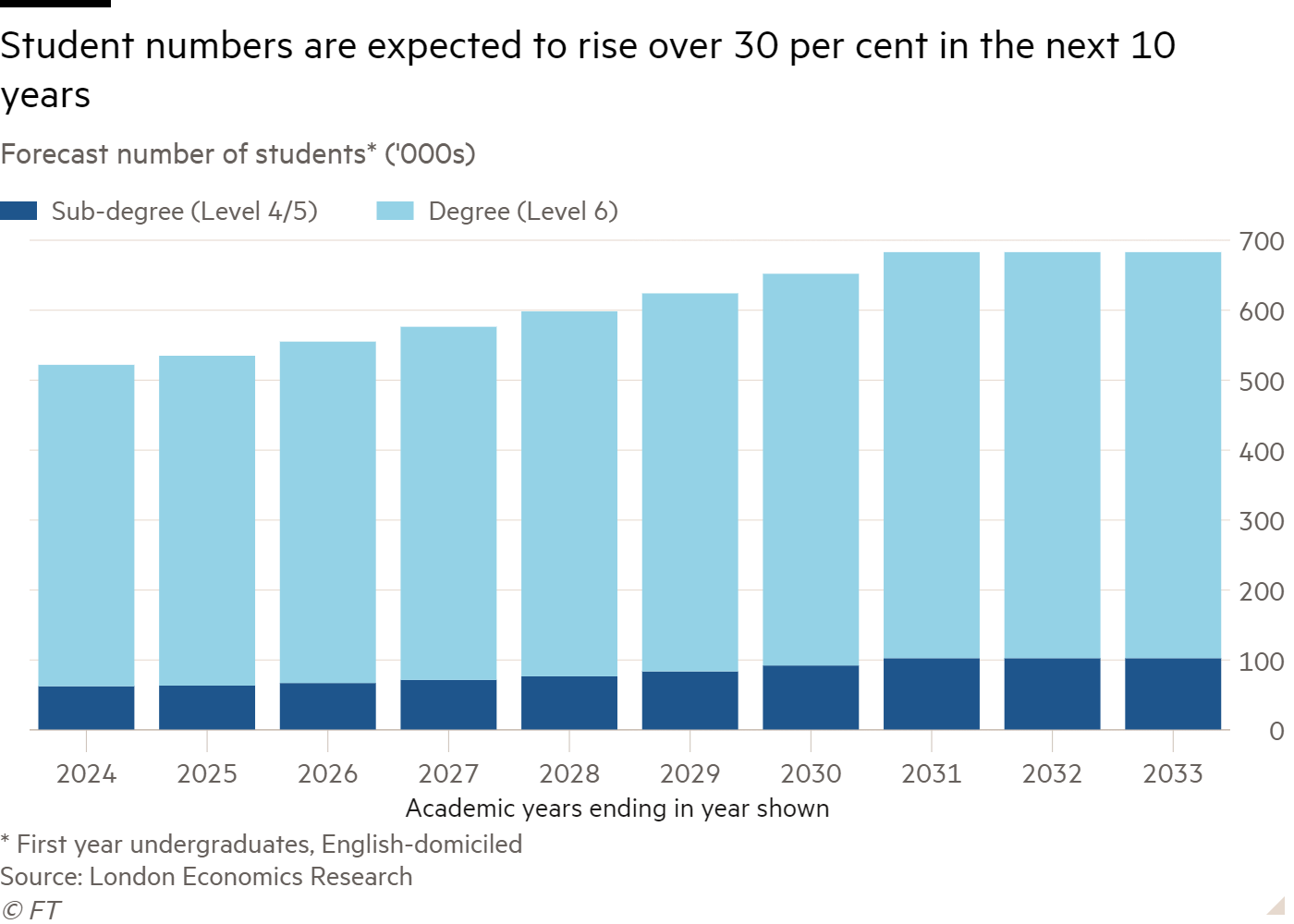The next UK government must boost investment in skills training to accommodate a looming increase of 150,000 more students seeking higher education by 2030 in England, educational experts have warned.
In a report to be published this week The Association of Colleges, which represents technical colleges, will argue that extra demand caused by a short-term rise in school-leavers must be a catalyst for creating more educational opportunities for those not studying traditional degrees.
The number of first-year undergraduate students in England entering higher education will increase by about one-third by the end of the decade — from roughly 522,000 this year to 683,000 in 2030-31, according to estimates commissioned by the AOC from the consultancy London Economics.
David Hughes, AOC chief executive, said the jump in numbers would put a “huge strain” on education budgets over the coming parliament and pointed to a need to expand provision of apprenticeships and higher technical qualifications.
“Despite ever-increasing spending on more undergraduate higher education courses at universities, the skills needs of the nation are not being met,” he added, noting: “Too many people are missing out on the skills they need and employers are crying out for.”
The number of 16- to 18-year-olds is projected to rise by 18 per cent between 2021 and 2030 — referred to as a “demographic bulge” — creating a temporary increase in student demand.

The wave of additional students will break over the tertiary education sector at a time when both universities, which offer traditional three-year degrees, and further educational colleges, which provide technical qualifications, face intensifying financial pressures.
Universities will make a £2,500 loss on each domestic student this year, according to estimates by the Russell Group of research universities, which expects the figure to double by 2030 unless government policy on fees changes.
The sector is unable to raise undergraduate tuition fees, which have been in effect frozen at £9,250 a year for a decade, and is struggling to recruit the higher-paying foreign students it relies on to subsidise lossmaking domestic places.
At the same time, government spending on skills will be 23 per cent below 2009—10 levels, according to analysis by the Institute for Fiscal Studies think-tank. This is despite the Conservatives authorising a £900mn increase in day-to-day funding for adult education and apprenticeships by 2024-25 announced in the last spending review.
The apprenticeship levy introduced in 2017 has also failed to deliver the expected boost to training, with starts in England falling by 33 per cent, or 160,000, in 2022-23 compared with 2014-15, according to London Economics.
Ahead of the election expected this year, the opposition Labour party has said it will turn existing further education colleges into “technical excellence colleges” if it wins, but has stopped short of promising institutions more funding or support.
Labour has also said it would reform the apprenticeship levy to boost the types of training businesses can use it on, in the hope it will increase the number of people taking up apprenticeship places.
The AOC has proposed reforms to the levy to funnel funds from business into training in areas of national and local need, greater control for local authorities and colleges to deliver local skills and improved links between the college and university sectors.
Educational experts said any future government would have to confront the looming funding crunch in the sector to deliver greater fairness, but also to tackle the UK’s entrenched skills shortages and low economic productivity.
Lord Jo Johnson, a former Conservative minister for higher education, said that while recent reforms to the student loan system had saved the Treasury nearly £3bn a year, universities that hit performance targets should be allowed to increase their fees in line with inflation.
Policymakers should also remove the cap on FE college places in order to “level up” education, he added, providing more opportunities for the 30 per cent of 18-year-olds currently not in education or training.
“We need the same ‘demand-led’ system of available places for FE that we have in HE, as well as a higher level of funding per student, so that we have a stronger system of skills training for those who never go into higher education,” he added.
Professor Alison Wolf, the crossbench peer and educational expert who was a part-time adviser to Number 10 policy unit on skills until February last year, said the demographic bulge offered “a window of opportunity” to rebalance the HE system.
She added that the recent drive by universities to attract more undergraduates had shrunk the share of students attending FE colleges and left the country increasingly “locked into” a single, high-cost model that favoured traditional degrees over technical qualifications.
“The current system reduces opportunities for adults who do not live near universities, or cannot follow a course structured for full-timers. Change is always easiest when there are no upfront losers,” she said.
Sir Philip Augar, who led a 2019 review into the higher education system, said it was important that the temporary increase in the number of school leavers did not lead to overcapacity in the university sector longer-term.
Augar said the introduction of the Lifelong Learning Entitlement from 2025-25 provided an opportunity to begin to dissolve perceived barriers between degree-level and technical qualification.
The scheme offers adult learners to access loans equivalent to four years’ worth of higher education to spend flexibly on degree or technical-level qualifications.
“When the numbers of 18-year-olds start to decline and universities have gaps on their campuses, then perhaps universities and FE colleges will seize the chance to work together and jointly offer degrees and qualifications via the LLE,” he added.
The Department for Education said it was working with employers to create more alternatives to traditional degrees, including apprenticeships and Higher Technical Qualifications in key sectors including digital, construction and health.
“There are more high-quality opportunities for students than ever, and we are investing billions so every young person has access to the education and training they need to succeed,” a spokesperson added.
Read More: World News | Entertainment News | Celeb News
FT











